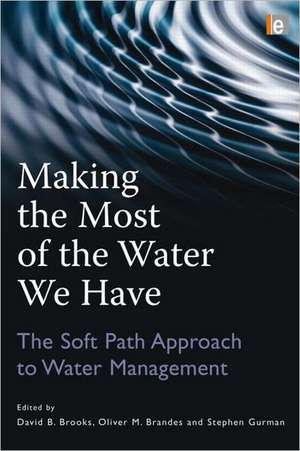Making the Most of the Water We Have: The Soft Path Approach to Water Management
Editat de David B. Brooks, Oliver M. Brandes, Stephen Gurmanen Limba Engleză Hardback – 25 iun 2009
Making the Most of the Water We Have is the first to present and apply the water soft path approach. It has three aims:
- to bring to a wider audience the concept and the potential of water soft paths
- to demonstrate that soft path analysis is analytical and practical, and not just 'eco-dreaming'
- to indicate that soft paths are not only conceptually attractive but that they can be made economically and politically feasible.
Published with POLIS Project and Friends of the Earth
Preț: 765.84 lei
Preț vechi: 1103.75 lei
-31% Nou
Puncte Express: 1149
Preț estimativ în valută:
146.59€ • 159.28$ • 123.22£
146.59€ • 159.28$ • 123.22£
Carte tipărită la comandă
Livrare economică 21 aprilie-05 mai
Preluare comenzi: 021 569.72.76
Specificații
ISBN-13: 9781844077540
ISBN-10: 1844077543
Pagini: 296
Ilustrații: illustrations, index
Dimensiuni: 156 x 234 x 25 mm
Greutate: 0.54 kg
Ediția:1
Editura: Taylor & Francis
Colecția Routledge
Locul publicării:Oxford, United Kingdom
ISBN-10: 1844077543
Pagini: 296
Ilustrații: illustrations, index
Dimensiuni: 156 x 234 x 25 mm
Greutate: 0.54 kg
Ediția:1
Editura: Taylor & Francis
Colecția Routledge
Locul publicării:Oxford, United Kingdom
Public țintă
Academic and Professional Practice & DevelopmentCuprins
Introduction 1. Why a Water Soft Path, and Why Now Part 1: Water Soft Paths as Human Vision 2. Avoiding the Perfect Storm: Weathering Climate Change by Following its Effects on Water Resources 3. In the Beginning: Soft Energy Paths 4. Getting it Right: Misconceptions About the Soft Path 5. Practising Ecological Governance: The Case for the Soft Path for Water 6. Water Policy in Canada: Changing Course for the Soft Path Part 2: Water Soft Paths as Analytical Method 7. Getting Quantitative: The Canadian Water Soft Path Studies 8. Turning Principles into Practice: The WSP Scenario Builder 9. Thinking Beyond Pipes and Pumps: Water Soft Paths at the Urban Scale 10. WSP Analysis at a Watershed Scale 11. WSP Analysis at a Provincial Scale Part 3: Water Soft Paths as Planning Tool 12. Removing Institutional Barriers to Water Soft Paths: - Challenges and Opportunities 13. Pushing the Boundaries: Shifting Water Soft Paths Philosophy towards Hard Policy in Municipal Water Management 14. Green Buildings and Urban Space 15. Water Soft Path Thinking in the United States 16. Water Soft Path Thinking in Other Developed Economies – A. England B. The European Union C. Australia 17. Water Soft Path Thinking in Developing Countries – A. South Africa B. India C. Middle East and North Africa. Conclusion 18. A Water Future Different from the Past. Annex: How to Create A Soft Path Plan For Water. Index
Notă biografică
David B. Brooks was Canada's first Director of Energy Conservation, and later spent 15 years with IDRC (International Development Research Centre) on overseas projects on energy, water and natural resource management. He was one of the founders of Friends of the Earth Canada and now serves as its Senior Advisor - Fresh Water. Oliver Brandes is Water Sustainability Project Leader and Associate Director at the POLIS Project on Ecological Governance, University of Victoria, Canada. Stephen Gurman is an environmental consultant and writer, based in Ottawa, Canada.
Recenzii
'This book looks ahead to provide the context within which to consider our use and management of water as we enter an increasingly uncertain future.'Dr. David Suzuki, Professor Emeritus, University of British Columbia, author, broadcaster'The book provides a timely review of how political economies worldwide have been introducing soft path approaches. It is immensely strengthened by authors who introduced the idea to the water sector and diffused it among water scientists, engineers and planners.'From the Foreword by Professor J A [Tony] Allan, King's College London and the School of Oriental and African Studies, University of London, UK'It is the first book to present a comprehensive view of the soft path and focuses on water solutions, not just technologies but also analysis methods and governance. The importance of this book is its vision and attempt to persuade readers - stakeholders, educators, the media, NGOs, and water managers - to adhere to the soft path paradigm.'Water International'Making the Most of the Water We Have lays out the key ingredients of a water soft path (WSP) in plain language. It makes its case with some really fine writing, especially in the first four chapters...The real achievement of this book is that it offers details regarding soft path water planning possibilities for rich nations and poor nations alike.'Robert Paehlke, Critical Policy Studies
